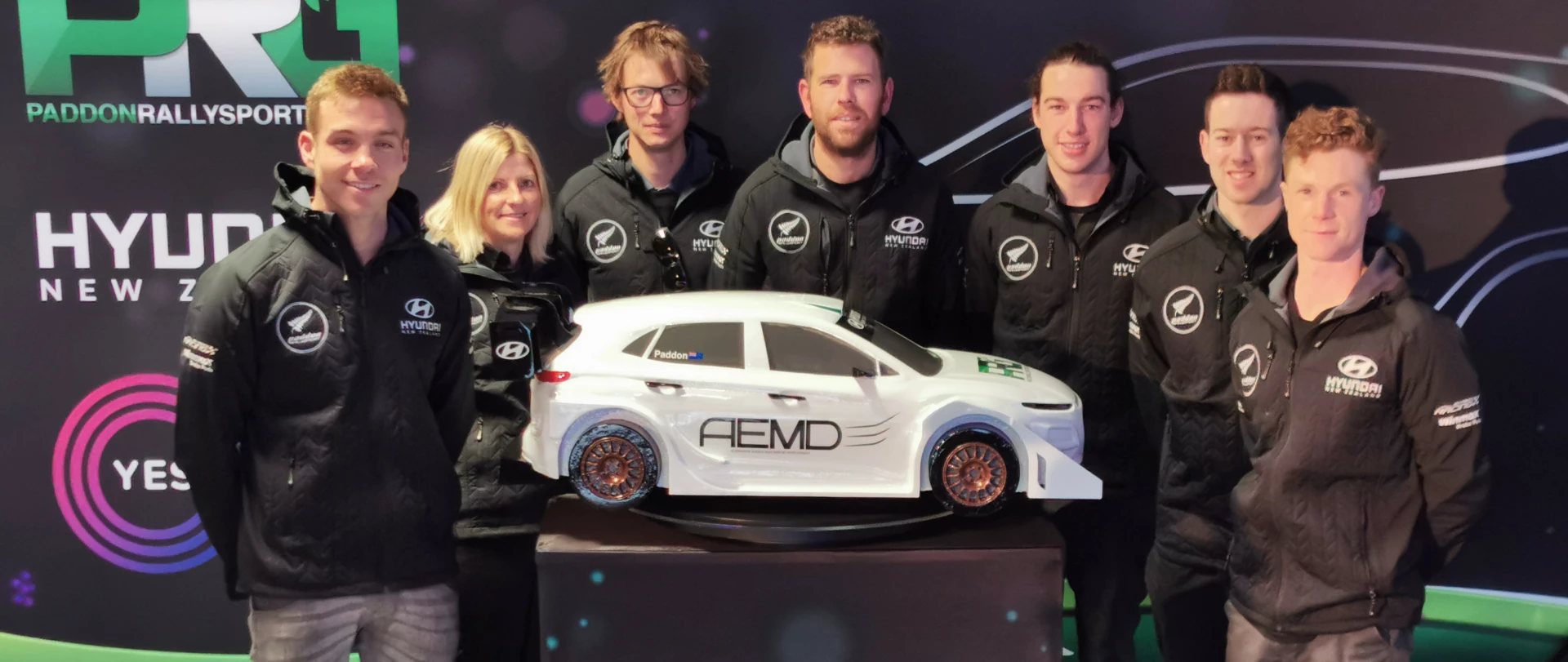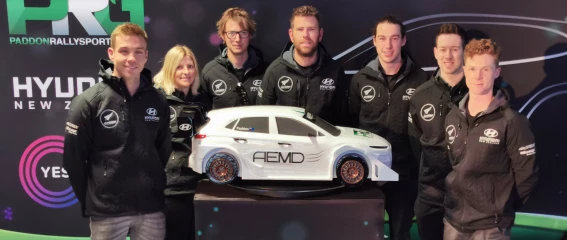Share
The Paddon Rallysport Group Hyundai EV Rally Car Project
The original idea
Early in 2018, Hayden Paddon spent some time thinking about what he wanted to do with Paddon Rallysport Group (PRG) as a team. What was the team’s future? It would always involve rallying, but would the focus be domestic or international?
And, first, Paddon and fellow PRG director, his father Chris Paddon needed to consider what the motorsport scene could look like in five or ten years in terms of global competition and the technologies being used.
Paddon: “Looking at cars currently used in rally competition, it’s difficult to see a business opportunity as the technology is outdated. While alternative energy powerplants are very quickly evolving in the consumer-focused automotive sector, the same developments are not as widespread in motorsport and certainly not in rallying.”
These thoughts came following a conversation with a friend in 2017 when they discussed the concept of electric-powered rally cars.
“He suggested they possibly offered a new way to approach commercial investment. At the time, I screwed up my face thinking: ‘Not EV!’ Probably not unlike most motorsport enthusiasts and their first impressions of the concept.
“But the more I thought about it, I could see how the commercial benefits and potential business opportunities to use it to take our team international stacked up.
“I think there’s probably always a place for traditional combustion cars, but the very top tier of all motorsport disciplines needs to be in line with the vehicle industry and major manufacturers, otherwise motorsport will disappear.”
Turning an idea to a plan
Turning an idea into a viable business plan takes effort, commitment, resources and time.
From that initial thinking about PRG’s future, then came:
- Consideration of how PRG should be structured in terms of personnel and the skills required.
- The search for a suitable location and facilities.
- Development of the concept to a point that it could be discussed with possible commercial partners.
- Discussions and confirmation of technical partnerships with organisations which could support the project with research and development.
Paddon says: “It’s been a very long process since the start of 2018 – working out the structure of PRG and the personnel, creating a new division of PRG called Alternative Energy Motorsport Development (AEMD), searching for possible locations with the right facilities, and then talking with people who we thought had the right skills for the project.
“With the concept at a certain point, we approached possible commercial partners. With their support, we were able to develop the concept through to the planning stages and formally involve our first people.
“The cornerstones of the project are the technical partnerships we have been able to establish with Stohl Advanced Research and Development (STARD) in Austria and the University of Canterbury Engineering Facility, specifically their University of Canterbury Motorsport project team.”
The project’s core objective
The project’s main aim is to, ultimately, create a Hyundai EV rally car capable of running full day of rallying.
The project also showcases what PRG can do with their new way of thinking about electric vehicle technologies and how these can be applied to the sport of rallying.
Paddon says: “The first Hyundai Kona EV rally car will be a showstopper in terms of performance and will do things differently to electric-powered competition vehicles seen to date.
“One element of this is sound – I’m committed to making sure our car creates the kind of noise a rally fan enjoys. From an entirely practical point of view, a rally car needs to create a loud and distinctive sound for the safety of officials, marshals, media and spectators out viewing the rally action. The sound of a rally car travelling towards you on a stage and then popping into sight, and racing on is one of the magic elements of rallying for fans. So this is a vital element.
“Our goals for 2020 are to focus on short format events to help us develop the Hyundai EV rally car’s performance and reliability.
“Moving into year three, 2021, we will focus on expanding the EV rally car’s range so it’s capable of running in full length rallies. This is a key challenge that underpins all the development work since the project started.”
What is the project’s timeline?
- Prototype 1 of the Hyundai Kona EV rally car will be running in April 2020.
- Throughout the remainder of 2020 PRG will be testing/developing and running the first prototype in smaller events in New Zealand
- In 2021, the first Hyundai Kona EV rally car will be developed to the point that it can contest a full programme of rallies.
- Throughout this time, PRG will also developing the second prototype Hyundai EV rally car for completion in 2021.
What challenges need to be overcome?
As mentioned above, traits associated with current EV technology require a different solution when applied to an EV rally car, such as:
- Sound
- Range
Additional challenges outlined in the project brief are:
- Harnessing engine performance and torque vectoring for gravel/low grip situations
- Fire and safety systems
- Safety processes for rally event personnel
- Charging systems
“We have a number of engineering challenges to resolve,” says Paddon. “Finding solutions to these aspects is an important aspect of our technical partnerships with STARD and UCM, and the fact our own team is determined to think outside the box, to come up with new solutions.
“From some of the EV technology that already exists, performance is already there – some cars have up to 1000bhp (745kW). It’s how you harness that performance into the specific requirements of rallying, for example with torque vectoring for gravel/low grip situations.
“We are working with MotorSport New Zealand to establish safety guidelines and we are working on our own fire and safety systems.
“Rallying opens up more challenges compared to circuit racing in terms of range, charging systems and sound, and when we find solutions for these elements, many will be applicable to the general road user/EV car owner.”
How are you working with motorsport governing bodies?
PRG is working to the current EV safety guidelines produced by the global governing body of motorsport, the Federation Internationale de l’Automobile (FIA).
They are also working with MotorSport New Zealand to help establish a similar set of safety guidelines for the use of electric vehicles in domestic competition.
Paddon notes that the way in which electric competition vehicles and battery cells are now built are different from earlier versions. “This reduces the risk of serious incidents such as fire. In fact, the likelihood of a fire with our EV rally car is lower than our normal internal combustion rally car.
Why do you think the world needs electric rally cars?
Paddon is not alone in thinking that for motorsport to continue to grow and have that ‘top tier’, it needs to be current and relevant, that motorsport needs to be aligned with the future of the automotive industry.
“If it’s not aligned, the top tier of motorsport will disappear and without that top tier, the impact on all levels of motorsport – EV or not, would be massive. Motorsport was always at the cutting edge in new automotive technology, but that same level of cutting-edge technology doesn’t exist to the same level. We need to get ahead of the game.”
Electric vehicles are used in several forms of motorsport currently – a new Extreme E off-road series has recently been announced, electric hillclimb cars are setting records at famous events like Pike’s Peak, and the global FIA Formula E Championship are just a few examples.
“But there are no EVs in rally yet,” says Paddon. “And the beauty of rallying is that it combines all the challenges of the above motorsport disciplines which focus on performance or durability/range, but not both. Rallying creates an opportunity to combine both objectives.”
Will competitors embrace the concept of an electric rally car?
“I can understand that current motorsport enthusiasts will be on the fence to start, but like anything new, people can adjust. Ultimately the EV rally cars will be impressive and create a genuine, competitive and new form of EV motorsports. Everything will be different to what we think of now. EV competition vehicles will be seriously fast and they will all make noise as technology develops over the next few years.
“EV motorsports may also open the doors to people who may not currently watch motorsport. You have to remember we are a minor sport compared to many others, and if new technology and relevant technology creates interest from a new audience, then that’s also positive.”
Why is PRG the right organisation to undertake a project of this nature?
Paddon says: “As a team, we are pushing the envelope to think outside the box. The Kiwi environment and our highly regarded ingenuity make New Zealand the perfect environment to develop something like this. Like my driving career, failure isn’t an option. We have some amazing commercial partners, technical partners and some of the smartest young New Zealand engineers, and I know that we will succeed.”
Who are the personnel behind PRG’s ambitious project?
This project is headed up by project manager Matt Barham, with Jack Williamson and Rory Callaway helping on the design side.
They are supported by workshop manager Mike Pittams and Ben Fretwell who will fabricate and build the prototype.
Paddon himself and Administration Manager Vanessa MacAskill keep the project’s wheels in motion and ensure they hit target dates.
PRG’s partnership with STARD is crucial for the supply of major components, and PRG’s design team works closely with STARD to confirm and test concepts.
PRG’s partnership with UCM (University Canterbury Motorsport) sees UCM’s young and hugely passionate team of engineers responsible for the aerodynamics, testing and manufacturing tasks.
Who are the project’s main backers?
Given Paddon’s own strong partnership with Hyundai New Zealand, it’s logical that one of New Zealand’s best selling vehicle marques – with its own commitment to electric and hybrid technologies – have come onboard to support the PRG EV rally car project.
“Hyundai New Zealand and PRG shares the same vision of the future of the automotive sector,” says Paddon. “We are also planning to work towards new technology ideas within this project together.
“Our recently-announced partnership with YES Power is also key to this project, as our official power company partner.”
Paddon has made good use of his ability to forge strong commercial partnerships by also exploring wider funding options. “We have been fortunate to secure Callaghan Innovation funding which was a critical step to make this project possible. Together with Callaghan Innovation and Hyundai New Zealand-supported Pinnacle Programme – which support 15-18 year olds looking to develop their skills and leadership abilities to be the best in their chosen field – PRG is ensuring new and young people are involved throughout the project to help the development of skilled and passionate personnel.
PRG’s achievements to date
- Four-time New Zealand Rally Champions
- Helped Hyundai New Zealand to achieve first ever manufacturer’s title for Hyundai anywhere in the world
- Propelled Hayden Paddon on to WRC level through national championship rallying and Pirelli Star Driver scholarship.
- 95% finishing rate over 12 years in New Zealand events
- New Zealand's most successful rally team

